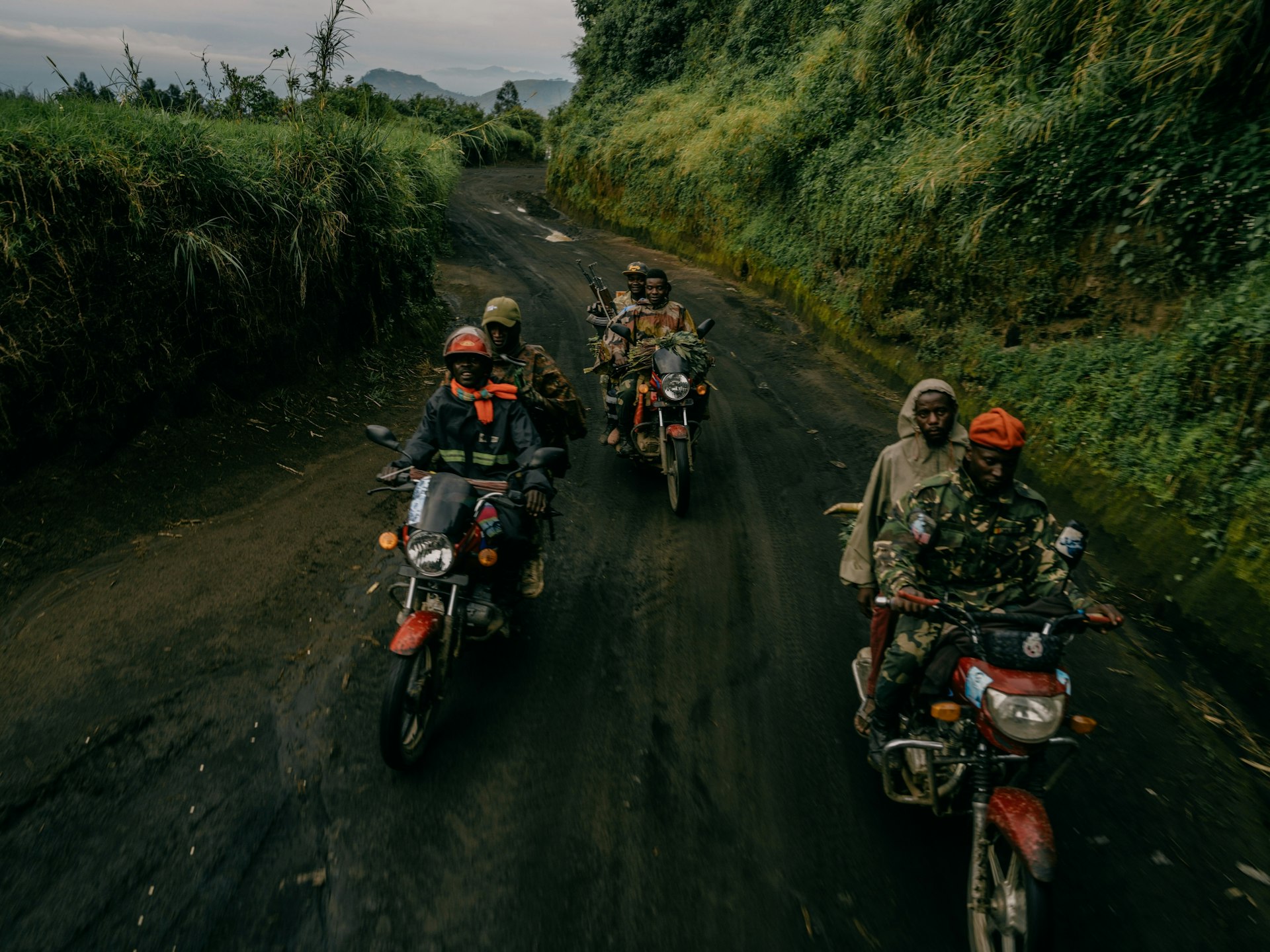Chronicling conflict and survival in the Democratic Republic of Congo
- Text by Miss Rosen
- Photography by Hugh Kinsella Cunningham

Along the eastern edge of the Democratic Republic of Congo, nestled under the Virunga mountains lies the North Kivu province, a verdant landscape home to over eight million people that has been brought to siege since the late 1990s.
Deep within the rich and fertile lands lie extraordinary reserves of cobalt, uranium, and copper, whose value to foreign interests has fueled a brutal web of political instability, military conflict, displacement, and death. In recent years, violent clashes between the Congolese army and a rebel group called M23 have forced more than one million civilians have been forced from their homes.
“The M23 rebel group is built around former Congolese army units who mutinied,” says photographer Hugh Kinsella Cunningham, who has been documenting the conflict since it exploded in 2022.
“M23 claim to fight for the rights of ethnic Congolese Tutsis but the regional context is extremely complex and the rebels are used as a proxy army by Rwanda,” Cunningham says. “While talk of ‘blood technology’ can often oversimplify this conflict, a key aim of the M23 rebels was to seize the world’s largest coltan mine – an element essential to modern electrical equipment.”

Cunningham has born witness to the conflict escalating from fighting in remote mountain areas to a refugee crisis with massive displacement camps, with civilians trapped by heavy weapons outside the ever-shrinking perimeter.
“Displacement camps can be very unsafe for the residents, sexual violence is rife, and artillery is often within earshot, but people have been extremely generous with their time and their honest expressions of their experiences of conflict,” says Cunningham, who recently received the Amnesty International UK Media Awards 2024 for this body of work and will be exhibiting the work in Displaced by the M23 at Visa pour l'image festival in Perpignan, France.
Working across portraiture, reportage, and drone photography to show people from various walks of life surviving the war, Cunningham creates a multi-dimensional document that has real-time implications.


“The propaganda output of the M23 rebels and their Rwandan backers focuses on a narrative that M23 is fighting genocidal militias in the Congo so these photographs are an essential document that the main victims are actually these families forced far from home,” he says.
Cunningham also points to a forensic element of the work, noting, “The aerial photographs showing munitions strike locations and frontline areas are an essential part of documenting crimes against civilians and forcing accountability on armed actors in an extremely opaque conflict.”
Cunningham’s portraits show the human face of conflict that often gets lost in war photography. “The portrait photography takes place in a quiet area of a camp, and once community members have seen the first few pictures taken, a gentle rhythm emerges as others also want to speak and be photographed,” he says.


Accompanying the portraits are testimonies that amplify the stories of those who have been stripped of so much but still have their voice. 'The attack was a month ago in Kibumba,” Lazare Mbavu, a 72-year-old man, told Cunningham. “Not once in my life have I seen the Congolese invade Rwanda, but they often bring war here. We don't know why this is happening to us, and watching for atrocities each day. Our people cry all the time, we sleep in unsuitable places and eat badly.”


Displaced by the M23 is on view August 31–September 15, 2024, at Visa pour l'image festival in Perpignan, France.
Enjoyed this article? Follow Huck on Instagram.
Support stories like this by becoming a member of Club Huck.
Latest on Huck

A behind the scenes look at the atomic wedgie community
Stretched out — Benjamin Fredrickson’s new project and photobook ‘Wedgies’ queers a time-old bullying act by exploring its erotic, extreme potential.
Written by: Isaac Muk

“Welcome to the Useless Class”: Ewan Morrison in conversation with Irvine Welsh
For Emma — Ahead of the Scottish author’s new novel, he sat down with Irvine Welsh for an in-depth discussion of its dystopic themes, and the upcoming AI “tsunami”.
Written by: Irvine Welsh

“Struggle helps people come together”: Sharon Van Etten & The Attachment Theory
Huck’s February interview — To hear more about the release of the indie darling’s first collaborative album, we caught up with her and Devra Hoff to hear about the record, motherhood in music and why the ’80s are back,
Written by: Isaac Muk

Nxdia: “Poems became an escape for me”
What Made Me — In this series, we ask artists and rebels about the forces and experiences that shaped who they are. Today, it’s Egyptian-British alt-pop shapeshifter Nxdia.
Written by: Nxdia

Kathy Shorr’s splashy portraits inside limousines
The Ride of a Lifetime — Wanting to marry a love of cars and photography, Kathy Shorr worked as a limousine driver in the ’80s to use as a studio on wheels. Her new photobook explores her archive.
Written by: Miss Rosen

Lewd tales of live sex shows in ’80s Times Square
Peep Man — Before its LED-beaming modern refresh, the Manhattan plaza was a hotbed for seedy transgression. A new memoir revisits its red light district heyday.
Written by: Miss Rosen